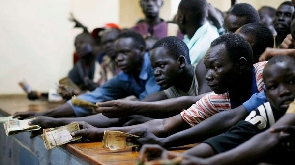 South Sudanese citizens jostle to exchange their currencies in Juba (PC: Reuters)
South Sudanese citizens jostle to exchange their currencies in Juba (PC: Reuters)
The government of South Sudan banned the use of the dollar in the economy as part of the conditions towards building a track record for future IMF-supported financing programmes.
The EastAfrican understands that the dollar bans which were effected in February were part of the conditions under the nine-month Programme Monitoring with Board Involvement (PMB) that sought to achieve the international reserve targets.
The IMF staff team led by Niko Hobdari which visited South Sudan from May 3-12 lauded the country’s authorities for implementing prudent fiscal and monetary policies and meeting all but one end-March 2023 quantitative targets under the PMB.
Amongst the targets which were met by South Sudan at the end of March 2023 included quantitative targets on international reserves, Bank of South Sudan (BoSS) net credit to the government, the payment of salaries to central government workers and the non-contracting and non-guaranteeing of new non-concessional debt by the central government.
“The authorities are implementing prudent fiscal and monetary policies. All but one End-March 2023 quantitative target under the PMB was met. In particular, the BoSS has continued to refrain from monetary financing of the budget since August 2022,” said Mr Hobdari.
Net credit
“As a result, the level of reserve money has remained broadly unchanged since End-August 2022, which will stabilise the economy. The authorities have also met the end-March 2023 quantitative targets on international reserves, BoSS net credit to the government, the payment of salaries to central government workers and the non-contracting and non-guaranteeing of new non-concessional debt by the government.”
In February, the government suspended the use of the dollar and directed all transactions to be executed in the local currency, the South Sudan Pound (SSP), in a move it feared would stifle economic activities in the war-ravaged economy.
Most transactions in the world’s newest nation were initially carried out in the dollar largely due to hyperinflation and the volatility of the local currency.
Transparency, reforms
However, the Government through the BoSS banned the use of the greenback and directed that all commercial contracts be signed in SSP.
The IMF backed the move to restrict the dollar in local transactions and contracts arguing the South Sudanese authorities’ efforts to ensure that the existing legal framework regarding the legal tender for domestic transactions should be respected.
The IMF mission and the South Sudan authorities also agreed on key steps to take forward key governance and transparency reforms targeted under the PMB including the adoption by the Transitional National Legislative Assembly of an amendment to the BoSS Act that would strengthen BoSS independence in line with international best practices.
Others are the publication of oil revenue and budget execution reports, and the adoption of the time-bound action plans to strengthen recommendations of the Auditor General’s reports on the two RCF disbursements of November 2020 and March 2021.
“Discussion will continue in the coming weeks on a 2023/2024 fiscal year budget that is consistent with a realistic resource envelope, with a view to supporting macroeconomic stability and maintaining public debt sustainability, enabling the completion of the first PMB review,” according to IMF.
The IMF has also advised the South Sudan authorities to cut non-critical spending to manage the economic and humanitarian crisis emanating from Sudan’s conflict through increased refugees and disruption of cross-border trade resulting in increased prices of food, medical goods and essential food staples.
“Nevertheless, dealing with the Sudan crisis spillovers will require a more determined response. The mission, therefore, urged the authorities to suspend non-critical spending to create a buffer to deal with the increasing costs from the spillovers and leave room for manoeuvre if the situation deteriorates further,” according to IMF.
On March 1 it approved the disbursement of $114.8 million to South Sudan under the Food Shock Window of the Rapid Credit Facility (RCF) to help the country address food insecurity while maintaining social and growth-enhancing spending.
Concurrently, the fund’s Executive Board discussed a 9-month Staff-Monitored Programme with Board Involvement (PMB) for South Sudan which was approved by the Fund on February 17, 2023.
The IMF board was convinced that South Sudan’s policy programme is sufficiently robust to meet the key objectives of the PMB.
Its implementation is aimed at helping the authorities establish a track record toward an IMF-supported upper credit tranche programme.
The PMB seeks to guide policies that safeguard macroeconomic stability, ensure debt sustainability and provide a framework for the authorities to deepen and broaden public financial management and governance reforms.
The PMB also sets targets to safeguard priority social spending and public sector salaries.
“The IMF supports the South Sudan authorities’ efforts to ensure that the existing legal framework regarding legal tender for domestic transactions is respected,” IMF’s Resident Representative for South Sudan Guy Jenkinson told The EastAfrican in an emailed response.